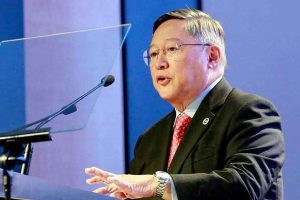FINANCE Secretary Carlos G. Dominguez III urged the Asian Development Bank (ADB) to lead a climate action information and best-practices exchange program within the Association of Southeast Asian Nations (ASEAN).
“Climate change might be a global problem,” Mr. Dominguez said in a statement on Saturday. “The issue, however, exhibits itself most starkly in our smallest communities. I am sure that the ADB will be ready to help us promote the exchange of climate change action and adaptation practices among the ASEAN countries.”
Mr. Dominguez also said an ADB program would be a better alternative to relying on international entities, such as the United Nations Climate Change Conference of the Parties (COP), which he says leans heavily towards big-picture problem-solving and not solutions specific to local communities.
Mr. Dominguez brought up the prospect during the signing of two loan agreements on June 3. One was a $250-million policy-based loan intended to finance the Climate Change Action Program, Subprogram 1 (CCAP1), and the other the Capital Market-Generated Infrastructure Financing, Subprogram 2 (CMGIF2), a $400-million policy-based loan intended to help develop and boost the domestic capital market, infrastructure financing, and insurance and pension funds.
“The two programs (CCAP1 and CMGIF2) are not unrelated. An improved infrastructure backbone will increase the efficiency of our economy. It will enable us to improve our climate resiliency and spur sustainable growth,” Mr. Dominguez said.
CCAP1 is the ADB’s first climate change-based policy loan, making the Philippines a pioneer in climate policy development financing in the region.
“This initiative will hopefully encourage other countries to design and accelerate the implementation of their own climate programs,” Mr. Dominguez said. “This sends a very strong signal to the international community that the Philippines is fully committed to deliver on our climate ambitions.”
The Philippines has set a goal of cutting its greenhouse gases (GHG) emissions by 75% by 2030, particularly from agriculture, waste material, industry, transport, and energy, based on its Nationally Determined Contribution to the Paris Agreement, in which nearly 200 countries pledged to mitigate their respective GHG emissions.
The Philippines is considered one of the countries most at risk to climate change, with an average of 20 typhoons landing in its territory every year, causing flooding and damage to infrastructure.
On Thursday, the ADB greenlit a $4.3-billion loan for the South Commuter Railway Project, which is expected to halve travel time between Metro Manila and Calamba. It is expected to generate 35,000 jobs during construction and another 3,200 permanent jobs for its operation, including giving those along its line potential access to more than 300,000 jobs. — Tobias Jared Tomas
